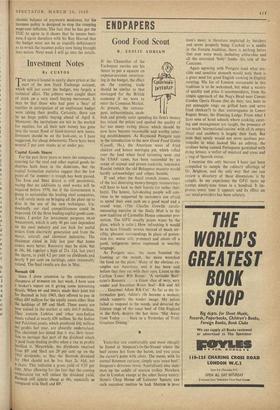Investment Notes
By CUSTOS
'Thu: upward bound in equity share prices at the I start of the new Stock Exchange account, which will just cover the budget, was largely a technical affair. The jobbers were caught short of stock on a very small buying movement. It may be that those who had gone a 'bear' of equities in anticipation of an unpleasant budget were taking their profits. Certainly, there can be no large public buying ahead of April 6. Moreover, the institutions are not in the market for equities, for all their new money has gone into the recent flood of fixed-interest new issues. Investors should be on the look-out, as I have suggested, for cheap debentures. There have been several 7 per cent stocks at or under par.
Capital Goods Shares
For the past three years or more the companies catering for the steel and other capital goods in- dustries hale been in the doldrums, but the capital formation statistics suggest -that the low point of the investment trough has been passed. The Iron and Steel Board is still pessimistic, saying that no additions to steel works will be required before 1970, but if the Government is going to nationalise the leading steel companies, It will surely insist on bringing all the plant up to date in the use of the new techniques. Un- doubtedly our steel competitiveness could be Improved. Of the three leading capital goods com- panies, I prefer for investment purposes HEAD WRIGHTSON, which is only 40 per cent dependent on the steel industry and can look for useful orders from electricity generation and from the motor, aircraft and chemical industries. The chairman stated in July last year that home orders were better. Recovery may be slow, but at 18s. 6d. (against a high of 21s. l{d. last year) the shares, to yield 4.2 per cent on dividends and nearly 9 per cent on earnings, seem reasonably valued. The final results are due in May.
Burmah 00
Since I drew attention to the comparative cheapness of BURMAH OIL last week, I have seen a broker's report on it giving some interesting details. When BP and SHELL made their joint bid for Burmah in July 1963, they offered to .pay in effect £85 million for the equity assets other than the holdings of BP and Shell. These assets are now valued in the market at only £41.9 million. They contain Lobitos and other non-Indian assets valued at nearly £36 million. So the Indian and Pakistani assets, which produced £41 million net profits last year, are absurdly undervalued. The chairman has stated that it was their inten- tion to increase that part of the dividend which is paid from trading profits when a rise in profits iustified it. Meanwhile, the dividends received from BP and Shell are 20 per cent up on the 1963 dividends, so that the Burmah dividend for 1964 should not be less than 2s. 6Id. net a share. This indicates a gross yield of 9.35 per Cent. After allowing for the fact that the coming corporation tax will reduce the dividend yield, 1111rmah still appear cheap at 48s, especially as Compared with Shell and BP.














































 Previous page
Previous page